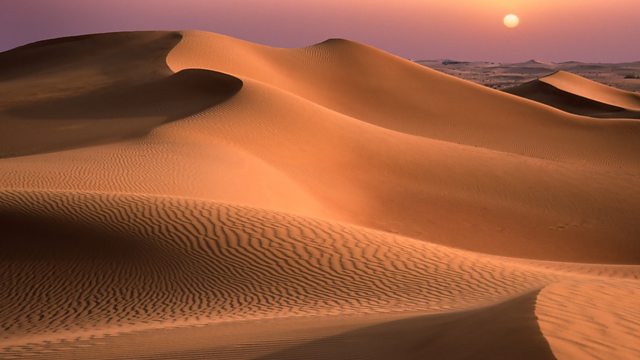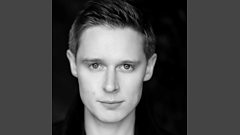
Deserts and Springs
Texts and music on the theme of deserts and springs, with readers Sylvestra Le Touzel and Samuel Barnett. With TS Eliot, Shelley and Hardy, plus Britten, Schubert and Messiaen.
Sylvestra Le Touzel and Samuel Barnett read prose and poetry exploring deserts and springs, both in physical form - the bone-dry wilderness which water turns to fertile soil, and as metaphor - the wasteland of existential emptiness, transformed by the streams of spiritual nourishment. Readings from TS Eliot, Shelley, Hardy and Banjo Paterson, and music by Britten, Schubert, Messiaen and Duke Ellington.
Last on
More episodes
Previous
Next
Music Played
Timings (where shown) are from the start of the programme in hours and minutes
-
![]() 00:00
00:00Bedrich Smetana
Vltava (from Ma Vlast)
Performer: Prague Philharmonia, Jakub Hrusa (conductor).- Supraphon SU40322.
- Tr 2.
-
John Bunyan
Upon the fish in the water, read by Sylvestra Le Touzel
![]() 00:02
00:02Benjamin Britten
Fish in the unruffled lakes
Performer: Philip Langridge (tenor), Steuart Bedford (piano).- Naxos 8.557204.
- Tr 13.
![]() 00:04
00:04Franz Schubert
Liehaber in allen Gestalten (D 558)
Performer: Barbara Bonney (soprano), Geoffrey Parsons (piano).- Teldec 4509 90873-2.
- Tr 7.
Mechthild of Magdeburg, translated by Jane Hirshfield
The desert has many teachings, read by Sylvestra Le Touzel
Percy Bysshe Shelley
Ozymandias, read by Samuel Barnett
Emily Dickinson
After a hundred years, read by Sylvestra Le Touzel
![]() 00:09
00:09Olivier Messiaen
La source de Vie (from Livre de Sainte Sacrement)
Performer: Erik Bostrom.- Proprius PRCD 9015.
- CD1 Tr2.
![]() 00:11
00:11Alphonse Hasselmans
La source (op 44)
Performer: Rachel Masters (harp).- Regent REGCD 102.
- Tr 14.
Banjo Paterson
Song of the artesian water, read by Samuel Barnett
![]() 00:17
00:17John Antill
A Rain Dance (from Corroboree)
Performer: New Zealand Symphony Orchestra, James Judd (conductor).- Naxos 8.570241.
- Tr 4.
E Annie Proulx
What I see (from Postcards), read by Samuel Barnett
![]() 00:26
00:26Sioux traditional
Intertribal (People get up)
Performer: Dakota Travels.- ARS Music EUCD1847.
- Tr 6.
![]() 00:27
00:27Korean traditional
Chul Pungryu
Performer: Seoul National Orchestra of Classical Music.- Playasound PS65023.
- Tr 3.
William Franklin Sands
from At the Court of Korea, read by Samuel Barnett
![]() 00:31
00:31Duke Ellington
Spring (from The River Suite)
Performer: Detroit Symphony Orchestra, Neeme Jarvi (conductor).- Chandos CHAN9909.
- Tr 4.
Ted Hughes
River, read by Sylvestra le Touzel
![]() 00:34
00:34Prague Philharmonia, Jakub Hrusa (conductor)
Vltava (from Ma Vlast)
- Supraphon SU40322.
- Tr 2.
T S Eliot
What the Thunder Said (from The Waste Land), read by Samuel Barnett
![]() 00:41
00:41Olivier Messiaen
Le désert (from Des canyons aux étoiles)
Ensemble: Marja Bon (piano), Hans Dullaert (french horn), Ger de Zeeuw (xylorimba), Wim Vos (glockenspiel),. Ensemble: Den Haag Percussion Group, Asko Ensemble, Schoenberg Ensemble, Reinbert de Leeuw (conductor).- Montaigne MO782142.
- CD1 Tr1.
![]() 00:45
00:45Félicien David
from L’entrée au Desert (from Le Désert)
Ensemble: Accentus, Orchestre de Chambre de Paris, Laurence Equilbey (conductor).- Naïve V5405.
- CD1 Tr1.
Horace Logo Traubel
from Alone in the Desert I Stood, read by Sylvestra le Touzel
![]() 00:49
00:49Aaron Copland
from Quiet City
Performer: LSO, Michael Tilson Thomas (conductor).- EMICD 5553582.
- Tr 1.
Thomas Hardy
Under The Waterfall, read by Sylvestra le Touzel
![]() 00:58
00:58Maurice Ravel
Jeux d'eau
Performer: Jean-Philippe Collard (piano).- EMI 5860612.
- CD1 Tr 4.
Glenn Ward Dresbach
Desert Song, read by Sylvestra le Touzel
![]() 01:04
01:04Bob Chilcott
The Desert from Miracle of the Spring
Ensemble: Nigel Charman, Markus Gruett (percussion) ����ý Singers, David Hill (conductor).- SIGCD 422.
- CD1 Tr9.
![]() 01:06
01:06Harrison Birtwistle
Virelai (sus une fontayne)
Performer: London Sinfonietta, David Atherton (conductor).- NMC D211.
- Tr 3.
Sarah Knowles Bolton
Genius and Talent, read by Sylvestra le Touzel and Samuel Barnett
![]() 01:11
01:11Bedrich Smetana
Vltava (from Ma Vlast)
Performer: Prague Philharmonia, Jakub Hrusa (conductor).- Supraphon SU40322.
- Tr 2.
Producer's Note
Deserts, prairies, solitary places, and those who seek them out - explorers, hermits, people who thrive on solitude and people who fear it – have long intrigued poets and writers. This Words and Music explores the idea of the desert, both in physical form – the bone-dry wilderness – and as metaphor – the wasteland of existential emptiness, isolation, and loneliness amongst the crowds: a space in which to contemplate and consider questions of life and existence. In contrast, springs, rivers and fountains can be both literally refreshing - bringing fertility to barren places and parched ground – but also metaphorical sources of life and renewal.
��
This evening’s programme contrasts writings on deserts ancient and modern – from the advice of Mechthild of Magdeburg (a medieval German nun and mystic – much like Hildegard of Bingen – who received visions of God from childhood) on how to live simply in the desert, through to T S Eliot’s image of the spiritual desert of modern life. In between, Shelley’s famous depiction of the vanity of humankind, alongside a more modern utterance of the same sentiments by Emily Dickinson; extracts from the memoirs of Williams Sands – a young American diplomat at the court of Korea in the early 20th century) and words from E Annie Proulx’s 1992 novel Postcards in which a character called Loyal Blood travels the American Mid-West, in search of work and better luck.
��
The writings on springs and water include verses by Banjo Paterson (the Australian author and journalist who wrote extensively about life in the Australian bush and outback and wrote Waltzing Matilda), a touching poem by Thomas Hardy about a glass goblet, lost forever in a valley brook, and typically pithy words by Ted Hughes.
��
The musical selection is underpinned by Bedrich Smetana’s famous symphonic poem Vltava - a picture in music of that great Bohemian river, from its source, bubbling up as two springs in the Bohemian woods. In addition, there are songs by Britten and Schubert, an extract from Olivier Messiaen’s Des canyons aux étoiles (an enormous orchestral score inspired by the deserts and mountains of Utah), music by the 20th-century Australian composer John Antill and – rather a rarity – part of a suite by a composer not usually associated with symphonic music: Duke Ellington.�� Completing the music, part of a recent choral work composed by Bob Chilcott which has been inspired by the ongoing drought in the American southwest, musical depictions of fountains by Ravel and Hasslemans, and Harrison Birtwistle’s re-composition of a 13th-century virelai on the same subject by Johannes Ciconia.
��
Michael Emery (producer)
Broadcast
- Sun 2 Aug 2015 18:00����ý Radio 3
The hidden history of plant-based diets
Books website
Get closer to books with in-depth articles, quizzes and our picks from radio & TV.
Gallery



